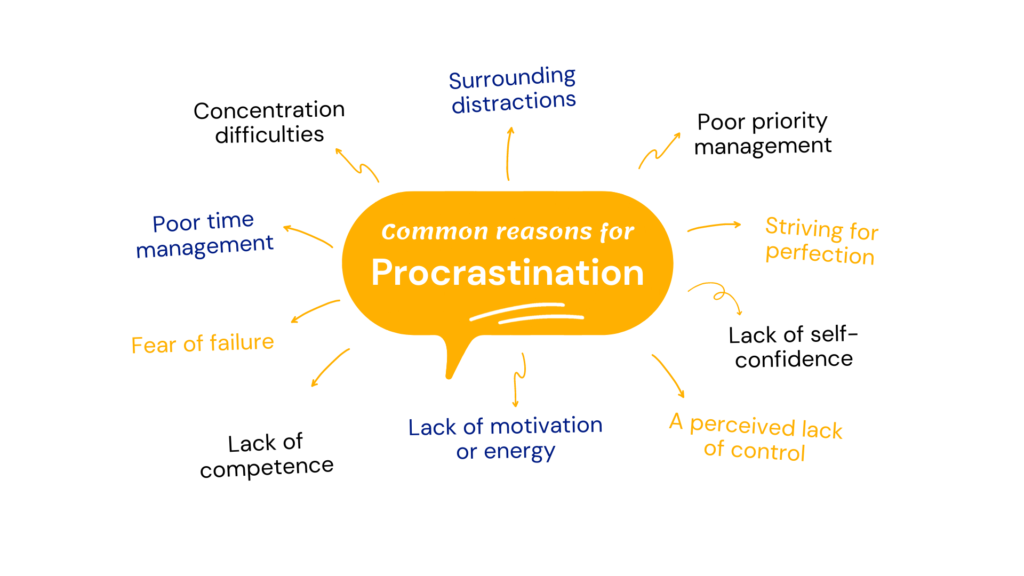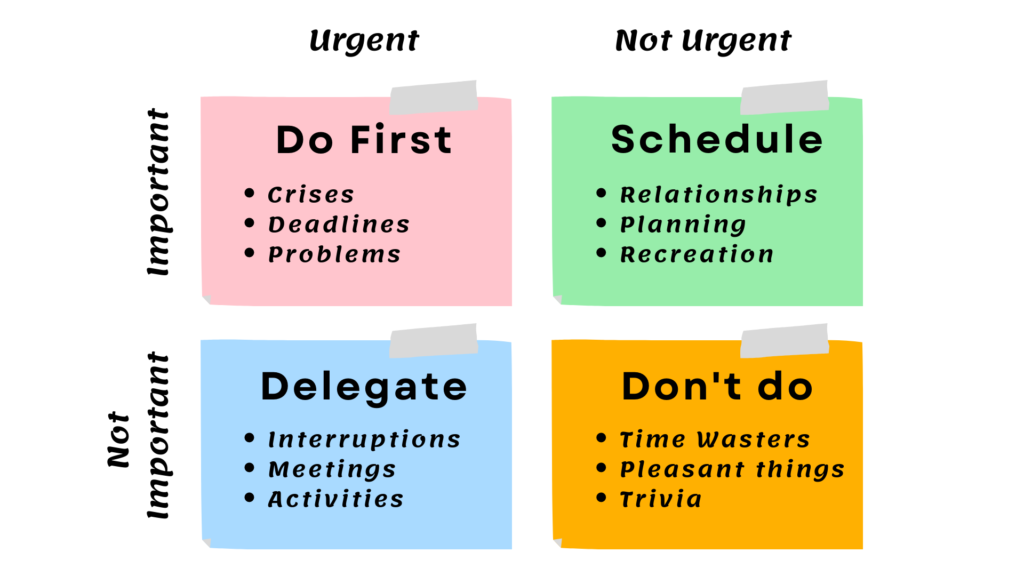Procrastination is defined as the voluntary postponement of an important, expected, or necessary activity, despite the probability that the negative repercussions would outweigh the benefits.
A person who postpones everything until the next day is called a procrastinator. Pre-crastinaton, on the other hand, indicates the tendency to complete tasks quickly just for the sake of getting things done sooner rather than later, and that’s definitely no better than procrastination!
According to a YouGov study, more than 50% of French people admit to procrastinating regularly. This phenomenon has grown to the point that it has an international celebratory day (25th of March) and a national holiday week (the first two weeks of March), both dedicated to procrastinating and putting off important tasks.
Causes of procrastination
Various studies on this subject have concluded that people often procrastinate to watch videos, spend time on the Internet, or just sleep. But, why do people feel the need to procrastinate?
Some psychological researchers stated that anxiety and the aversive nature of some jobs are primarily responsible for avoiding a task. Procrastination can also be due to a lack of concentration and a tendency to get distracted.
Here are the most common reasons why people procrastinate:
- Concentration difficulties
- Surrounding distractions
- Poor time and priority management
- Striving for perfection and fear of failure
- Lack of competence or self-confidence
- Lack of motivation or energy
- A perceived lack of control

Tim Urban, author of the blog “Wait but why”, explained during his TED talk that he believes there are two types of procrastination:
- When there is a deadline: When people have a deadline for completing tasks, they tend to procrastinate. After a while, panic kicks in, and last-minute stress becomes a source of motivation and energy to get things done.
- When there isn’t a deadline: Sometimes, the only mechanism to make procrastinators do things is panic, but since there is none in this situation, the limits of procrastination spread endlessly, forcing individuals to be spectators of their own lives.
9 Steps to avoid procrastination
Abraham Lincoln once said, “You cannot escape the responsibility of tomorrow by avoiding it today”. So, how to stop making excuses and delaying what you should be doing now?
Here are 9 steps to overcome the vicious endless circle of procrastination and the guilt it results in later:
- Plan your tasks: creating a simple to-do list and having a visual step-by-step plan can make things more simple for you. Plus, it creates some sort of commitment to completing the tasks you planned. Additionally, marking tasks as done can be one of the most satisfying things to do. You can use some tools such as Evernote, Google tasks, OneNote, etc.
- Identify your priorities: identifying which tasks need your urgent attention and which can be planned for a later time will help you avoid getting sucked in irrelevant tasks. One of the most effective tasks prioritization tools is the Priority Matrix as it allows you to prioritize your tasks according to their urgency and importance.

- Divide big tasks into small activities: Sometimes people tend to procrastinate when they face big intimidating tasks. The best way to handle such an issue is to break down big tasks into smaller, more manageable tasks.
- Set achievable goals: when setting goals to reach by the end of the day, for instance, try to create achievable goals. This can be done by making sure that your goals are: Specific, Measurable, Attainable, Relevant, Time-based.

- Combine an arduous task with a reward: Rewarding yourself after completing a task will only motivate you to accomplish more tasks. For instance, you can reward yourself by watching an episode of your favorite TV show after completing your daily to-do list.
- Take breaks and save time for relaxation: If you’re starting to get overwhelmed by a task, try taking a 10-minute break to clear up your mind and relax. This will help you get back to what you were doing and tackle it more efficiently.
- Choose optimum times to work in optimal conditions and avoid distractions: when you’re working on something and you know that you get easily distracted, make sure to choose the right time and place to do your work with no distractions around.
- Set deadlines and stick to them: As we mentioned earlier, deadlines can be a reason why some people procrastinate as it can be also a motivation factor to others. After listing the tasks you’re going to tackle, create a deadline for each task and commit to meeting each deadline. Having a specific time frame for completing a task might create an efficient pressure on you, leading you to be more productive.
- Ask for help when needed: When all of the above tips and tricks fail to help you manage your procrastination habits, and it becomes an obstacle for both your professional and personal life, you should consider asking for help. Help can be provided by a therapist, a life coach, or even a self-improvement book.
Prioritization techniques used in project management
Project management-wise, some Agile techniques prove to be ideal for overcoming procrastination:
The MosCow Method
It classifies the features or User Stories into Must Have, Should Have, Could Have, and Won’t Have categories. This method allows us to identify an MVP.
The Kano Method
This method is used to identify the most essential capacities by classifying functionalities or capacities into basic categories, performance, or attractive.
The Pairwise Comparison
Used for comparing each pair of User stories to determine their priority.
The 100-Point Method
Each stakeholder uses a total of 100 points to prioritize User Stories.
In addition to Kanban, which is an information radiator that advocates the visualization of workflows through a table, allowing the agile team to prioritize and track tasks’ accomplishment progress.
Check out more Tips & Tricks on how to manage work and time efficiently in The Essential Guide for New Project Managers.
